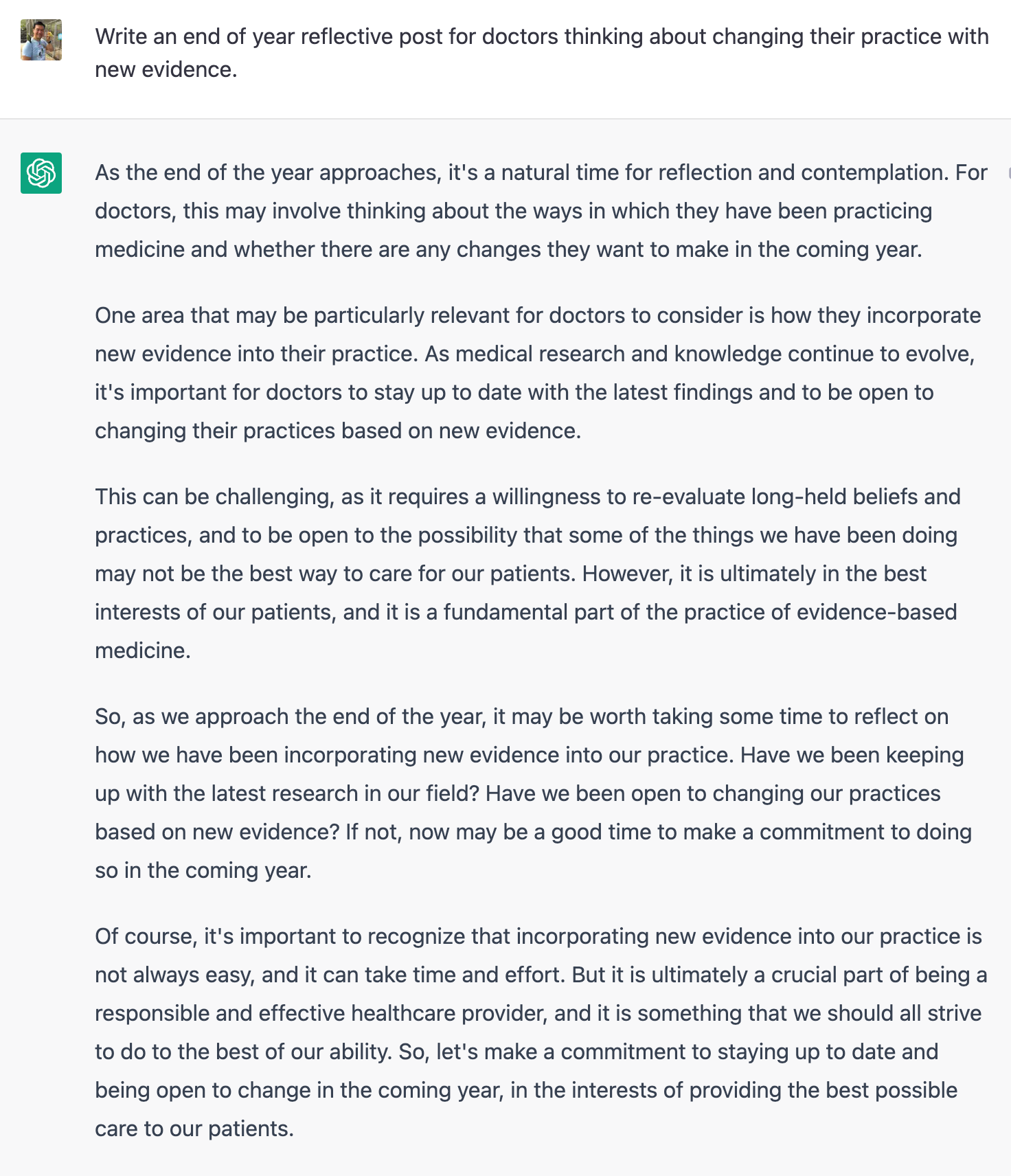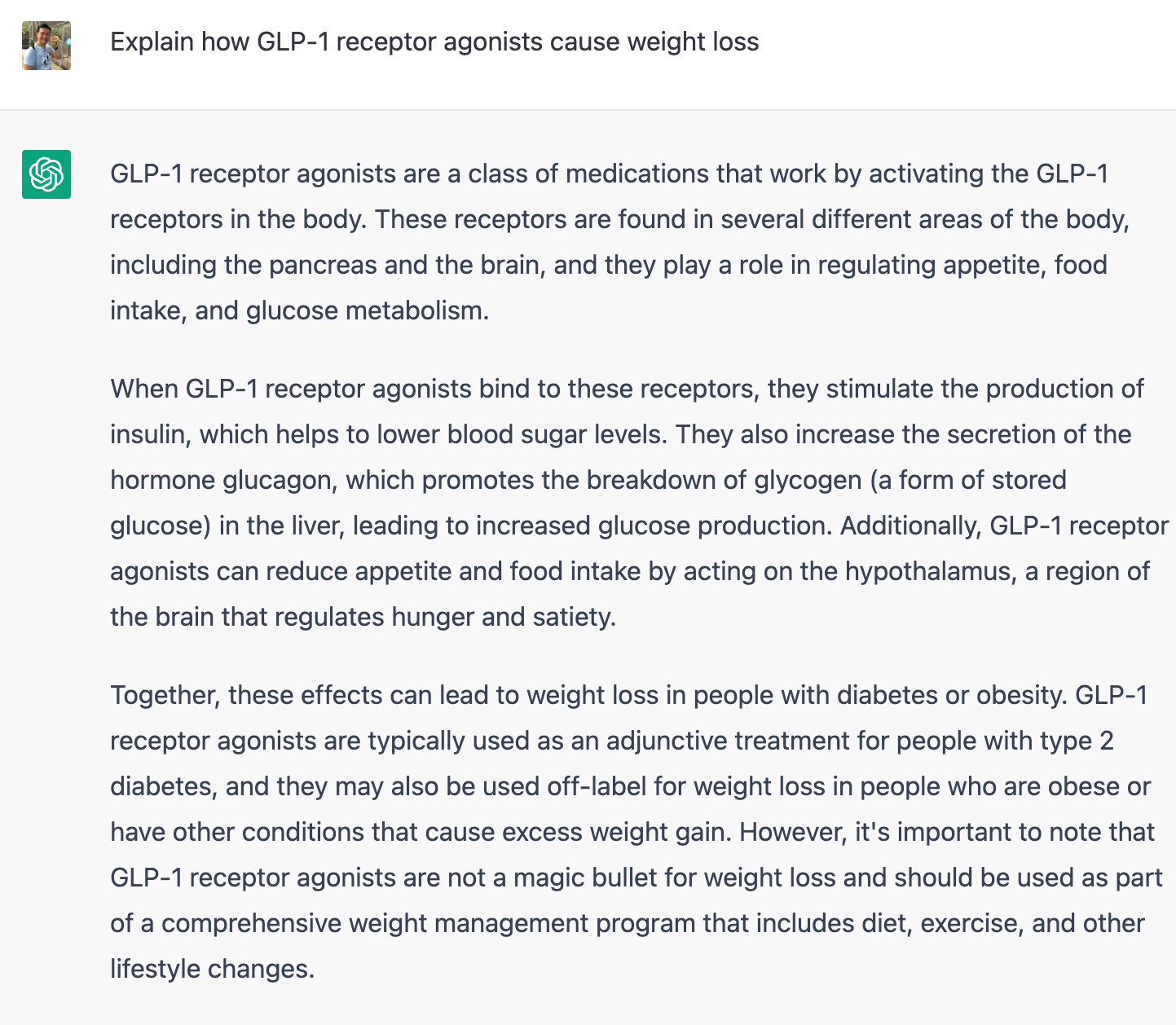I have always been fascinated by advances in technology and this year, artificial intelligence (AI) systems are capturing the public imagination. We’ve seen fascinating examples of AI-generated art. AI systems can make deep fakes, emulate someone’s voice in real time, and show it in a convincing video.
To spare you from an AI-enhanced selfie of me as a “heroic all-knowing doctor,” take a look at this AI-generated face made at https://This-Person-Does-Not-Exist.com — this site with one click will generate a picture of a non-existent person. Even better, the page gives a few tips on how to spot an AI-generated face.

An AI-based conversational generator called ChatGPT by OpenAI (https://OpenAI.com/blog/ChatGPT) can already make quite convincing passages of text — and it’s just in beta testing right now.
Here is an actual screenshot of my first time trying ChatGPT — take a look and see what you think of the AI-generated text.

Here’s how ChatGPT wrote a summary on a medical topic (unedited, first reply from the AI):

These systems are impressive, and they are just in their infancy — they will be even more impressive in the coming years. We should be aware that these systems rely on training datasets and their code incorporates certain assumptions and biases. Already, we are seeing AI-generated art causing controversies: artists’ works and styles are being incorporated without credit, and sexual and racial stereotypes are showing up in how the AI generates the art.
Text written by ChatGPT can sound quite authoritative, yet can be riddled with small errors. As more of our media will become AI generated and as these systems evolve, it will be harder and harder to identify fake images or untangle inaccuracies in written content.
While I do think AI will become a tool we integrate into all aspects of medical practice in the coming years, we still need our collective human intelligence to reflect on how our choices impact patients, their families, the medical system, and society. We might not always agree, but I’ve always held that respectful debate leads to learning and evolution of knowledge.
As per our tradition, here are 2022’s top 5 articles with the highest percentage for “will change my practice”:
- Mitigating the climate impact of asthma therapy by Drs. Val Stoynova and Celia Culley — 87.2%
- Diagnosis and treatment of polycystic ovary syndrome (PCOS) using virtual health by Dr. Caitlin Dunne — 79.1%
- Practice tips for heart failure with reduced ejection fraction (HFrEF): supporting patients with medications and self-monitoring by Shari Hurst — 69.2%
- Practice tip (for BC practitioners) utilizing PathwaysBC beyond specialist lookups — finding patient handouts, requisitions, point-of-care tools by Drs. Tracy Monk, Nick Graham, Karin Kausky, Michele Thomasse, and Ryan Gallagher — 68.3%
- Pharmacologic thromboprophylaxis in hospitalized patients with COVID-19 by Drs. Alejandro Dau, Agnes Lee, and Tony Wan — 67.2%
In the coming year at TCMP, we will be looking at website redesign and exploring other ways of presenting information such as more infographics, visual abstracts, and podcasts. We’d love to hear your feedback via https://thischangedmypractice.com/website-feedback/.
As always, on behalf of the team at TCMP, our best wishes to you and your circle. See you in 2023!
Steve Wong, MD, FRCPC
Internal Medicine
Clinical Associate Professor, Department of Medicine, UBC
Medical Director, This Changed My Practice, UBC CPD


Just for creating controversy, is the “This changed my practice” letter real or AI-generated? Is Dr. Steve Wong a real person and AI-generated professor at UBC?
So AI, like humans, has a difficult time saying “I don’t know”.